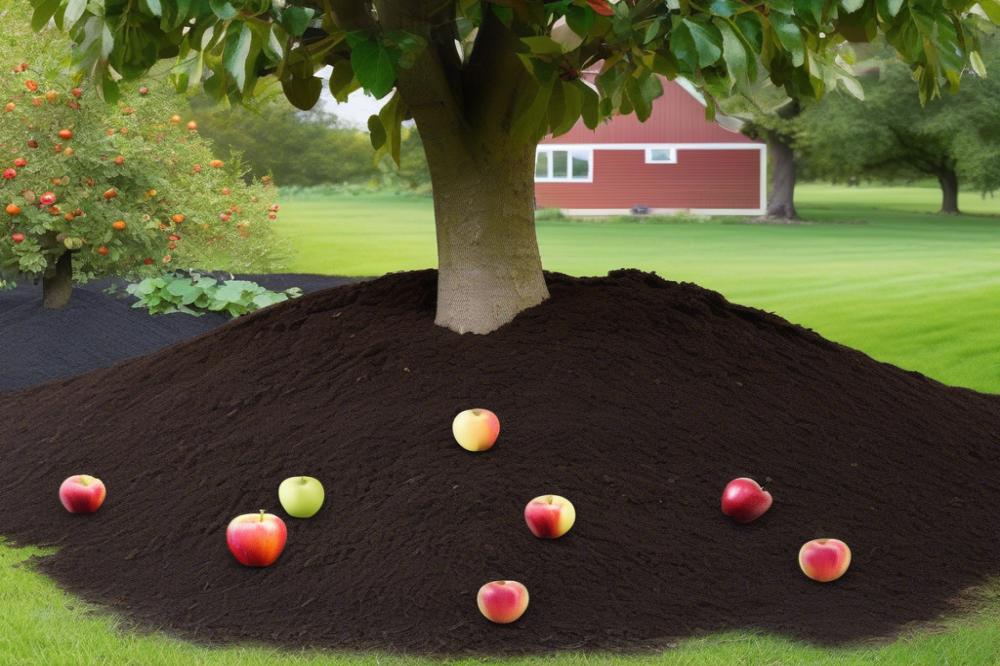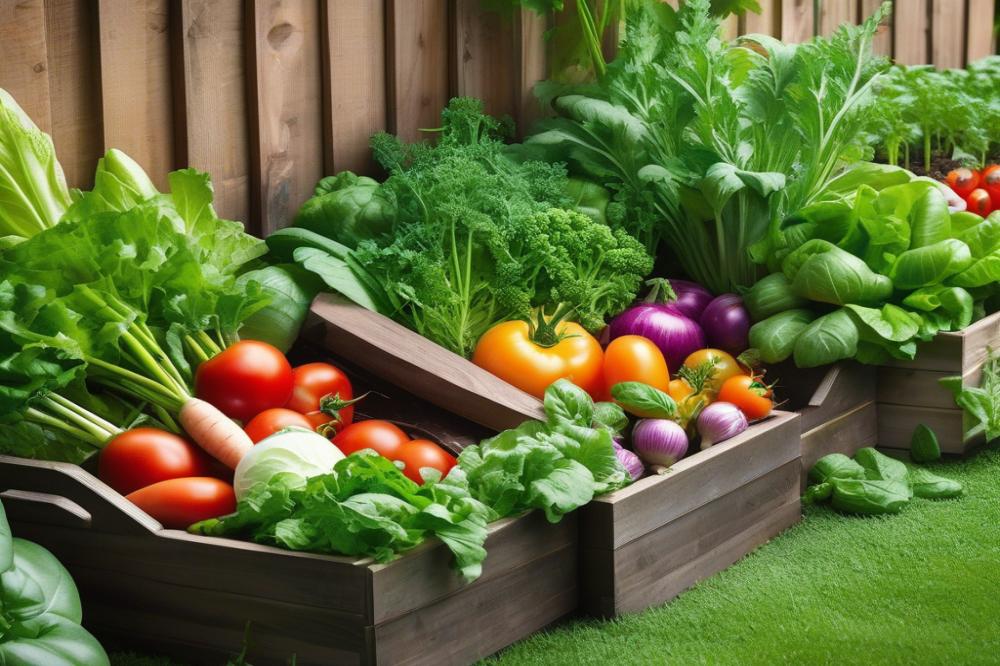Using mulch and compost to Enhance Apple Tree Growth
Sustainable gardening plays a vital role in promoting healthy ecosystems. Practices like using organic materials contribute to a thriving garden. Among these practices, adding mulch and compost can greatly benefit soil health, paving the way for flourishing plants. apple trees, known for their delicious fruit, thrive best when their growth needs are met. Such trees require ample sunlight, proper watering, and healthy soil filled with nutrients. They also depend on a well-balanced ecosystem that supports their development.
Soil health is crucial for apple trees as it lays the foundation for their growth. Rich, organic matter enhances fertility by providing essential nutrients. Moisture retention is an added benefit of well-maintained soil. This property helps trees withstand dry spells, ensuring that they receive necessary hydration. Furthermore, using compost not only supplies vital nutrition but also enriches the earth. A healthy soil structure encourages strong root systems, allowing trees to absorb water and nutrients more effectively.
Weed control is another aspect where the use of organic materials makes a difference. Weeds can compete for nutrients and water, negatively impacting tree growth. Covering the soil with mulch can help suppress unwanted plants while also protecting the roots. During winter, these materials provide insulation, shielding trees from harsh conditions. By maintaining a stable environment, apple trees can focus their energy on growth and fruit production instead of struggling against nature’s challenges.
Understanding Mulch

Mulch serves as a protective layer for the ground surrounding apple trees. This layer can be made from various materials. Some common types include wood chips, straw, grass clippings, and shredded leaves. Each variety has its unique benefits, so choosing the right one is important.
Applying mulch around apple trees offers several advantages. One significant benefit is moisture retention. It helps the soil to hold water, reducing the need for frequent watering. Additionally, this protective layer plays a vital role in weed control. Weeds compete with apple trees for nutrients and water, but mulch can keep them at bay.
Temperature regulation is another key benefit. During hot summer days, mulch keeps the soil cool. In winter, it provides essential protection against freezing temperatures. The benefits of mulch extend beyond immediate tree growth. Over time, it contributes to healthier soils through the addition of organic matter.
Organic matter from decomposed materials enriches the soil. This process supports soil health by improving nutrient supply. Nutrients are essential for the vibrant growth of apple trees. The breakdown of mulch also fosters a thriving ecosystem, attracting beneficial organisms.
Composting works hand in hand with mulch. Combining these practices leads to a more sustainable gardening approach. When utilized together, they create an environment where apple trees can flourish. Implementing proper mulch techniques will not only boost tree health but also strengthen the overall garden ecosystem.
Role of Compost

Compost is a vital part of gardening. It consists of decomposed organic materials, such as kitchen scraps and yard waste. By using compost, gardeners provide essential nutrients to plants. This nutrient supply is critical for apple trees, which need various minerals to thrive. Healthy soil supports these trees in flowering and fruiting.
The presence of organic matter in compost contributes significantly to soil health. This matter improves soil structure, making it easier for roots to grow. Well-structured soil retains moisture better. Apple trees benefit from moisture retention, especially in dry seasons. The right balance of water and air in the soil promotes healthy tree growth and robust fruit production.
In addition to nutrients, compost aids in weed control. A layer of compost around the base of apple trees can suppress weed growth. Less competition from weeds means your trees can access more resources. This is an important aspect of sustainable gardening. Furthermore, composting creates a closed-loop system that recycles waste into valuable resources.
Another benefit is winter protection. When compost is applied in the fall, it acts as insulation. This insulation helps protect roots from extreme cold. As a result, apple trees become more resilient to freezing temperatures. Using compost is a simple yet effective way to support tree health throughout the year.
Integrating compost into your gardening routine is an excellent decision. It not only boosts nutrient supply but also enhances overall soil fertility. In summary, compost plays a critical role in the growth and well-being of apple trees.
Combining Mulch and Compost

Using compost and mulch together can benefit apple trees significantly. This method enriches the soil while improving appearance and functionality. Applying compost as a base layer enhances soil health, while topping it with mulch offers protection and moisture retention. The key to success lies in the right layering technique.
Start by clearing the area around your apple trees of any weeds or old plant material. Spread a layer of compost, about 2 to 4 inches thick, around the base of the trees. Compost acts as a nutrient supply, feeding the roots and providing valuable organic matter. After applying compost, add a layer of mulch on top, ideally 2 to 3 inches deep. This combination aids in weed control and helps keep the compost in place.
Timing is crucial for applying this mix. Early spring or fall are great times to start. During these seasons, the earth warms, promoting fast growth of apple tree roots. Adding compost in fall allows it to break down over winter, enriching the soil when spring arrives. Regular applications, once or twice a year, maximize the benefits.
Frequency matters as well. A thin layer of compost can be added each year to keep the nutrient levels high. If you have limited compost, consider doing this every other year. The mulch can be refreshed annually, especially if it begins to break down or thin out. Always monitor the area for any signs of weeds or erosion.
Winter protection is another key advantage. When you layer compost and mulch together, the warm organic material helps insulate the roots. This shield against cold weather is vital to ensure that apple trees remain healthy through the season.
In the realm of sustainable gardening, combining compost and mulch supports a healthy ecosystem. Earthworms and beneficial microorganisms flourish in such environments, enhancing overall soil structure. The unique blend of nutrients contributes to robust tree growth while conserving moisture. By following these practices, you can create a thriving environment for your apple trees.
Effects on Soil Health and Tree Growth
Using compost contributes significantly to the health of the soil surrounding apple trees. This organic matter fosters enhanced microbial activity, which is crucial for breaking down nutrients and making them available to plants. Microbes are essential for a thriving ecosystem, as they help decompose material, adding vital nutrients back into the ground. Over time, this process leads to richer soil that supports better tree growth.
Moisture retention is another benefit of applying compost around apple trees. Well-decomposed compost acts like a sponge, absorbing water and holding it in the soil. This is particularly important during dry spells when water becomes scarce. The added moisture helps the roots of apple trees access what they need to flourish. In addition, compost can reduce the need for frequent watering, making it a practical choice for sustainable gardening.
Moreover, composting introduces a steady supply of nutrients over time. Apple trees benefit from a balanced mix of nitrogen, phosphorus, and potassium, which are essential for healthy growth and fruit development. These elements support vigorous tree growth and enhance fruit production. With proper nutrition, trees can produce more apples and have improved resistance to diseases and pests.
Another important aspect is weed control. A layer of compost can help suppress weeds that compete for nutrients and water. This protection allows apple trees to use available resources without having to compete with unwanted plants. The healthier the soil, the more thriving the tree becomes.
During winter months, compost can also provide necessary insulation for tree roots. This winter protection is crucial in cold climates. It helps shield root systems from frost damage and temperature fluctuations. Healthy roots contribute to overall tree vitality in spring, leading to robust growth and yields in the harvest season.
Research supports these practices, indicating that trees growing in enriched soil with ample organic matter tend to show marked improvements. Studies have shown increased growth rates and higher fruit quality when apple trees are nurtured with compost. With consistent use, the advantages of compost can be seen not just in individual trees, but also in orchards as a whole.
Winter Protection for Apple Trees
During the cold months, apple trees face various challenges. Proper winter protection is crucial for their survival and growth. A layer of organic material around the base goes a long way in shielding these trees. This organic matter acts like a blanket, insulating the roots from harsh frost. It keeps the soil temperature more stable, which is essential for root health.
Roots are more vulnerable than we often realize. In freezing temperatures, they can suffer from damage if left exposed. A thick layer protects the roots and helps prevent moisture loss. When the ground is insulated, it retains moisture better. This is beneficial, as apple trees need consistent moisture even in winter.
Proper mulching contributes significantly to soil health. It breaks down over time, enriching the soil with nutrients. As it composts, it adds essential organic matter that apple trees crave. This cycle supports a healthier tree and enhances its growth. A nutrient-rich base fosters resilience against pests and diseases.
Preventing weeds is another benefit. Weeds compete with apple trees for vital resources, including nutrients and water. A well-maintained layer of organic material reduces weed growth significantly. This protection allows the tree to focus on thriving instead of competing for resources.
When applying mulch for winter protection, a few tips can make a big difference. Spread it evenly around the base of the trees, starting a few inches from the trunk. This distance allows for airflow and prevents rot. Aim for a thickness of three to four inches. Such a depth provides adequate protection while still being manageable.
Additionally, choose materials wisely. Straw, shredded bark, and wood chips are excellent options. Each of these helps with moisture retention and adds to the nutritional value as they decompose. Avoid using materials that can harbor pests or diseases, like grass clippings from a lawn treated with chemicals.
Incorporating winter protection techniques aligns perfectly with sustainable gardening practices. Healthy apple trees not only provide delicious fruit but also contribute to the ecosystem. Engaging in thoughtful composting and mulching leads to a thriving garden. Protecting these trees in winter sets the stage for robust tree growth in the spring.
Sustainable Gardening Practices
Using compost enriches soil health, especially in apple tree cultivation. Organic matter builds a rich environment for roots to thrive. This not only supports tree growth but also improves the soil’s structure. Compost also aids in moisture retention, which is vital during dry spells. When water is held in the soil, apple trees can access it more easily.
Another benefit lies in the nutrient supply that compost provides. Nutrients released from decomposed materials enhance the overall fertility of the soil. Healthy soil translates into healthier trees and, ultimately, better fruit production. Furthermore, composting helps in reducing waste, as kitchen scraps and yard waste turn into useful soil amendments.
Weed control is yet another advantage of these gardening practices. With less competition from invasive plants, apple trees can grow without unnecessary stress. Additionally, a layer of organic matter can prevent weeds from sprouting. Keeping the area around the trees clear helps promote their growth and health.
Winter protection is essential for apple trees. Mulch helps insulate the soil and roots during freezing temperatures. This layer acts as a barrier against harsh weather, allowing the trees to survive better through the cold months. Although it may seem simple, such protection significantly impacts their ability to thrive.
Adopting sustainable gardening habits benefits the environment greatly. These practices support biodiversity by creating habitats for various organisms. A diverse ecosystem encourages natural pest control, reducing the need for chemical interventions. Thus, sustainable methods not only aid in growing apple trees but also contribute positively to nature.
Gardeners are encouraged to try these eco-friendly techniques. Starting with composting can be easy and rewarding. Keeping these principles in mind allows one to contribute to a healthier planet while enjoying the fruits of their labor.
Final Thoughts on Apple Tree Care
Using compost and organic matter plays a critical role in the growth of apple trees. Healthy trees thrive when they have the right nutrients in their soil. Compost enriches the earth, providing essential elements that trees need to prosper. Apply it around the base of your trees for the best results.
Covering the ground with organic material also helps in reducing weeds. By minimizing competition for nutrients and water, apple trees can focus on their growth. This simple action supports better fruit production and healthier foliage.
Throughout this article, we have discussed several key strategies. It is clear that maintaining soil health leads to stronger trees. Consistent application of these practices can pave the way for a fruitful harvest. Gardeners should embrace these methods to foster an environment where their apple trees can flourish.
Investing time in these techniques can bring rewards beyond just attractive trees. A thriving garden contributes to the overall ecosystem, benefiting both plants and wildlife. Begin implementing these strategies today for optimal results and enjoy the joys of gardening.



